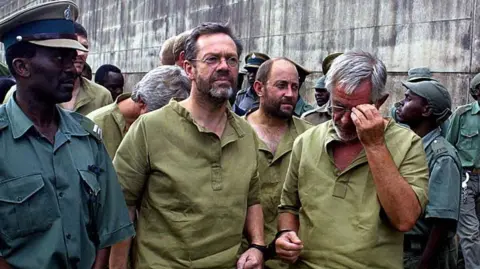Mercenary and Coup Plotter Simon Mann Dies at 72
Former British Army officer and infamous mercenary Simon Mann has died of a heart attack while exercising, friends confirmed. He was 72.
Mann gained notoriety after his involvement in a failed 2004 coup attempt in Equatorial Guinea, aimed at toppling President Teodoro Obiang Nguema and installing exiled opposition figure Severo Moto. Mann was arrested and later sentenced to 34 years in prison, though he served only five before being pardoned in 2009.
A Life of Conflict and Controversy

Educated at elite institutions including Eton and the Royal Military Academy Sandhurst, Mann joined the SAS (Special Air Service) and eventually rose to the rank of commander in the British Army’s elite unit.
After leaving the military, Mann made millions in the private security sector, especially in Africa, where he protected business assets in war-torn regions. But his fortune would lead him to one of the most audacious and controversial private military operations of the 21st century.
The Equatorial Guinea Coup Attempt
In 2004, Mann and more than 60 others were arrested in Harare, Zimbabwe, after their plane landed allegedly en route to Equatorial Guinea with weapons on board. They claimed to be en route to provide security for a mine in the Democratic Republic of Congo.
The plot was foiled, Mann later claimed, with help from the CIA. He admitted to being the “manager, not the architect” of the scheme, distancing himself from the full orchestration of the attempted regime change.
He was transferred from Zimbabwe to Equatorial Guinea’s notorious Black Beach Prison, where he feared for his life. “Friends, family, and enemies” warned him, “if that happens, you’re a dead man,” Mann told interviewers in 2011.

Regret and Reflection
After his release and deportation in 2009, Mann expressed remorse for his actions. “However good the money is,” he said, “the moral case has to stack up.”
His story became a cautionary tale of modern mercenarism, geopolitics, and power plays in Africa — and his death marks the end of a career that blurred the lines between soldier, businessman, and covert operative.
Related Reading: The SAS: Britain’s Elite Forces | Modern Mercenaries and Private Military Contractors | History of Coup Attempts in Africa